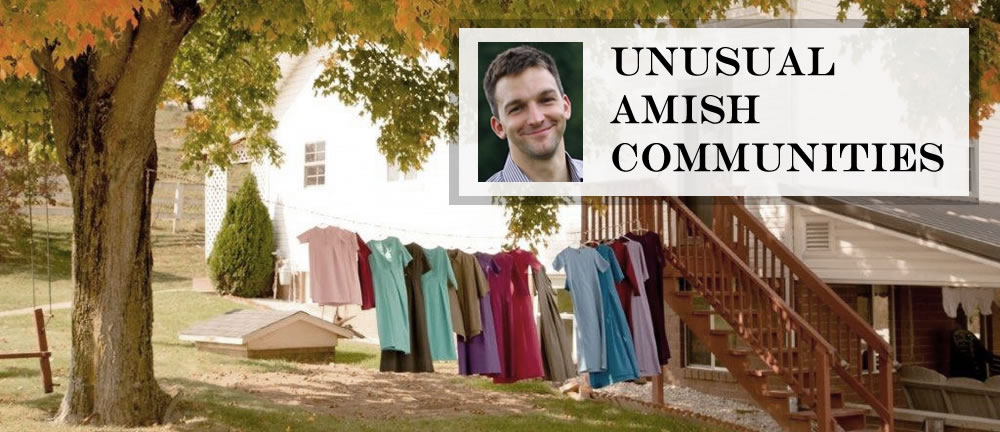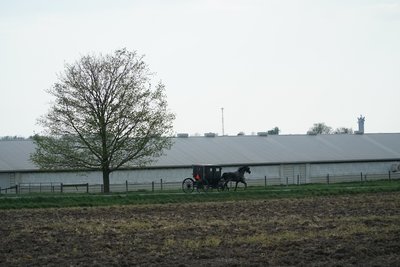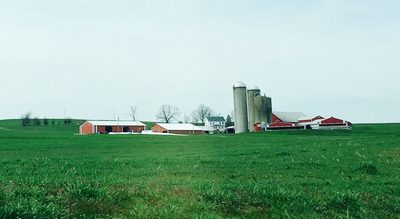
Unusual Amish Communities
You might be surprised to hear that Amish communities can and do differ. Erik Wesner, founder of amishamerica.com, a great source of information on everything Amish, contributes this guest blog about how practices among Amish communities vary.
Unusual Amish Communities
by Erik Wesner
The Amish might at first glance seem like a uniform group of people. Plain clothes, beards, buggies…yet within the 2500+ Amish congregations, there is a surprising amount of variety.
While all Amish hold certain religious and cultural features in common – horse-drawn transport, limited formal schooling, a belief in non-resistance, adult baptism, to name a few – beyond that, there is no one-size-fits-all Amish way of being.

To show you what I mean – each of the following communities or groups of Amish are unusual, in that they do something which most other Amish do not.
1. Amish with church buildings – Most Amish churches hold Sunday service in structures which are used for other purposes the other six days of the week. That might be a workshop, outbuilding, basement, or even a barn.
However, there are a few Amish communities that hold church in specially-constructed meetinghouses. Two of the best examples are the Amish in Somerset County, Pennsylvania and at Oakland, Maryland. Both of those communities are well over 150 years old, with a long tradition of meetinghouse worship.
2. Amish with “unique” buggy colors – If I asked you what color is an Amish buggy, what would you say? The most popular answers would be black or gray. Black buggies are the most common, widely seen across Amish society in such communities as Holmes County, Ohio; Arthur, Illinois; Ethridge, Tennessee; and the northern Indiana settlements, among many others. Gray buggies signify a church with Lancaster County roots – either a Lancaster County settlement buggy or one of its many spin-off communities.
But there are a few other buggy colors that are much rarer and specific to small groups. For instance, the Amish of New Wilmington, Pennsylvania sport a brown or burnt-orange covering on their horse-drawn transport. Meanwhile, the so-called “Nebraska” Amish group uses white-top buggies. And their neighbors in central Pennsylvania drive the most unexpected color of all – bright yellow carriages.
3. Amish without buggies – While the buggy is tied tightly to our concept of the Amish, there is one unique community where you won’t find any Amish driving them. That would be the settlement in Florida called Pinecraft, a Sarasota-area neighborhood.
This community has had a long history as a vacation spot for Amish in the colder months. It attracts some Amish retirees and youth as well. The neighborhood is bisected by a busy four-lane avenue, and really feels unlike any other Amish settlement. Basically being in the middle of a city, the Amish here get around the neighborhood using large tricycles, bicycles, and their own two feet.
4. Amish who allow public electricity – You’d think one bedrock “feature” of the Amish is their rejection of public electricity. While Amish will use a wide array of battery-powered devices, staying off-grid appears to be a key part of “Amish identity.”
Yet there is one very small group of Amish who do permit a public electric connection. The so-called “electric New Order” Amish dress plainly, drive buggies, and adhere to many of the religious and cultural tenets that other Amish churches do. But they have decided to permit public electricity as an in-home convenience. Examples can be found at Guthrie, Kentucky and Union Grove, North Carolina.
5. Amish who hold Sunday School – Finally, on how Amish spend their Sundays. Amish hold church on an every-other-week basis. On the “off” Sunday, they will typically have family worship at home. This usually consists of Bible reading, prayer, and devotions.

However there are some churches who spend that Sunday together in Sunday School. This is held for adults with a separate meeting for children. This practice is primarily seen among some New Order Amish churches.
One of the things that makes the Amish so interesting is the many different ways of being Amish seen across their 500+ communities. There are other examples besides these, of “unusual” Amish practices. Maybe you have met Amish that don’t perfectly “fit the mold,” or are aware of some other examples yourself.
Erik Wesner is the founder of amishamerica.com, where he writes regularly about Amish culture, communities and other topics.





